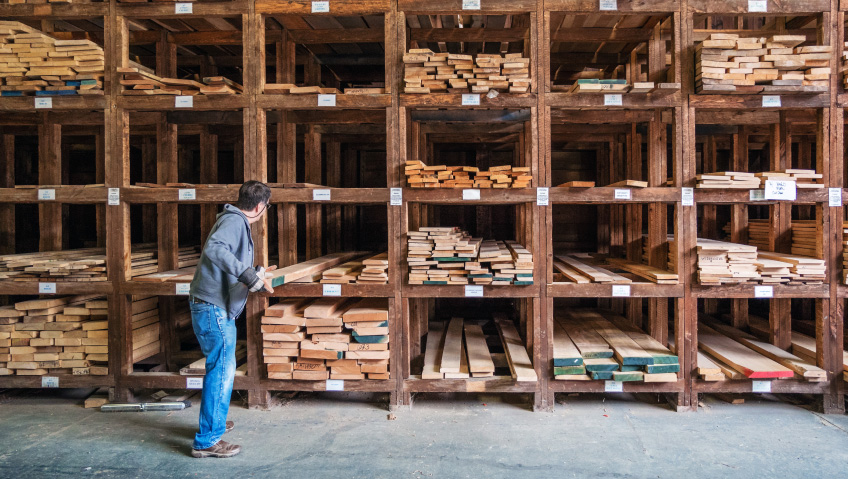Troy Lumber Company will soon be celebrating 80 years in business as an American, family-owned, yellow pine manufacturer. The company’s history began at the end of World War II, when Frederick Taylor, Sr. opened a plain mill operation in Troy, North Carolina. He thought that the United States would see a recession after the end of the war; instead, quite the opposite happened, as industry-wide price caps were lifted from commodities and the market entered a boom period.
In recognition of this development, Taylor, Sr. eventually bought the mill outright and began operations in earnest. Today, his son Frederick H. Taylor serves as Chief Executive Officer and grandson Fred L. Taylor is company President, linking three generations of Taylors to the family business.
President Fred L. Taylor began doing work for Troy Lumber when he was only 10 years old, shoveling bark and doing his part to pitch in with his loved ones. Over the ensuing decades, He came to accept his role as part of Troy Lumber and has found much enjoyment in his role as President, a title he has held since 2005. “The only reason I still own it is because I enjoy it,” he says, and he is happy to continue to represent and grow the company.
Taylor explains that the company has grown tremendously during his time as President and even within the last few years of this decade. He believes this can be attributed to circumstances as much as effort, because the COVID-19 pandemic in 2020 surprisingly ended up helping the lumber business overall. At the initial height of the pandemic in Spring 2020, a lot of the corporate mills in the country tried to shut down in anticipation of business slowing down, which took a lot of lumber off the market. However, as lumber became designated as an essential industry, Troy Lumber was still running and took advantage of the quieter market to great success.
Company fortunes at the time were also helped by the fact that many people stuck at home during lockdown began renovation projects such as building new decks, and this required a significant investment in lumber. Taylor recalls that hardware stores like Lowes and Home Depot were sometimes fuller than grocery stores during this period, and there was a tremendous supply-and-demand issue that Troy filled and greatly benefited from.
Although impressive, he says there were days during the pandemic when maintenance personnel had to run the machinery because the business was not able to run at full speed for one reason or another. In fact, he notes that the team, ever stringent in their germ-free protocols, ran out of hand sanitizer at one point, so had to make a trip to South Carolina to buy bottles of alcoholic beverage Everclear to mix into a homemade hand sanitizer and ensure a safe facility. Amidst all this, Troy Lumber never lost any time due to illness or absence, which Taylor says is a credit to staff who took both pandemic measures and employee health very seriously.
These pandemic measures are one aspect of a sense of caring for others that is baked into the DNA of the company itself. Taylor says that the Troy business model has to do with servant leadership, and that, “the only job I have is to make the job of folks around me easier and better.” Communication is a big part of the company and is paramount to understanding the problems of the people it serves and how they can be helped.
In his opinion, a lack of honesty in management for businesses is, ultimately, a shortcoming of the ownership because those in power do not put themselves in a position to make those working under them feel comfortable being honest. This can encourage workers to hide mistakes rather than fix them. “You have to have open and honest communication and that the people know you are on their side,” he says, and this must go both up and down the chain.
Safety is another value that the company holds very dear to its operations, undertaking daily and monthly safety meetings while keeping track of close calls and addressing whatever action may have caused it. Taylor says that the company’s experience modification rate (the method insurance companies use to measure worker’s compensation premiums) was not especially high in years past, but it is now even more favorable today thanks to cutting down dramatically on accidents. The company-wide effort has become one of its success stories, with every voice having a say in safety practices and incidents, as well as the ability to discuss strategy and product mix.
The lumber industry is not looking as robust as it could, with 2” x 8” planks at a similar price point to those seen during the Great Depression (a time when 10 to 20 percent of sawmills went out of business), Taylor explains. The good news, however, is that Troy Lumber itself is a much more efficient operation than it was nearly a century ago, and it is not losing money even as lumber itself is under a microscope.
Interest rates dropping in the sector will help matters, and with the U.S. still experiencing a housing shortage, Taylor feels that the scenario of Democratic Presidential Nominee Kamala Harris winning the presidency could mean a lot of positive moves for the industry, with national moves toward building more affordable housing.
The company’s recent growth also presents new and interesting opportunities. In 2023, Troy Lumber purchased a hardwood mill that was on its site; however, the mill is landlocked, and that imposed limits on what could be done with the property. The hardwood mill has since been converted to a pine one and will likely end up being a successful integration that will both broaden the product mix for the business and maximize the trees that are incoming.
By 2025, Taylor would like to see the company run consistently and perhaps even put projects behind it for a little while to see if it can grow its cash reserves. While Troy is always looking for ways to modernize its operations and be more efficient, it does not necessarily want to run in perpetuity for no reason, so a period of conservation may be what best serves the business for the long term.
Ultimately, the code of servant leadership is the guiding principle that will see Troy Lumber and the Taylor family move forward into the rest of this decade and beyond. As Fred Taylor says, everyone at Troy wants to be good corporate citizens for the community and help as much as possible in local efforts. This extends to being the employer of choice in the community, providing good jobs for people who want to work and aspire to do better.
Troy offers an extended hand to its local community members and to the lumber industry at large as an established name that continues to create opportunities and provide a great example of success for its contemporaries.






